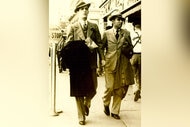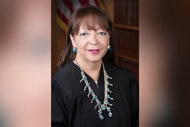Create a free profile to get unlimited access to exclusive videos, breaking news, sweepstakes, and more!
4 Questions For 4 Latina Criminal Justice Trailblazers: SCPD Chief Milagros Soto
In honor of Hispanic Heritage Month, Oxygen.com asked four trailblazing Latinas to talk about their professional experiences in our system of law and order. Suffolk County Police veteran Milagros Soto is the first Hispanic officer in the force's history to be made chief.

Suffolk County, New York is a place of many contrasts: situated on the eastern half of Long Island, it encompasses both the storied wealthy playgrounds of the Hamptons and the farms on the North Fork, as well as the commuter enclaves from which workers stream into Manhattan.
It's also home to a large Hispanic community: the 2020 Census reports that over 20 percent of the population of the county self-identifies as Hispanic. One of those residents is Suffolk County police veteran Milagros Soto who, in August, became the first Hispanic officer in the force's history to be made chief.
Latinas don't have a long history in law enforcement in the United States: the first known Latina hired by a police force was Josephine Collier, who joined the Los Angeles Police Department in 1946 (a full 30 years after the LAPD hired its first Black woman as an officer and more than 55 after the Chicago police hired its first woman, according to the U.S. Department of Justice). In 2016, only 2.1 percent of sworn officers in local police departments were Latina, and only 2.9 percent of chiefs were woman, according to the DOJ.
In an interview with Oxygen.com, Chief Soto spoke about why she decided to get into law enforcement, how she feels being visibly Latina makes a difference to the people she serves in Suffolk County and why she encourages people to consider law enforcement as a career.
Oxygen: What made you pursue policing as a career?
I was born and raised in the Lower East Side of Manhattan. I was blessed to have been raised in a Puerto Rican household. I come from a very large family; I’m the youngest of 11. The beauty of it was that my mom only spoke Spanish but my 10 older siblings spoke both languages and I benefited from that.
My older brother Pedro, who graduated from the New York City Police Academy when I was nine years old, was one of a very few Hispanic police officers that worked in that area. He was a police officer in 1973. My brother, when he started, he worked in the adjoining precinct, which was the 9th Precinct. The vast majority of law enforcement that worked in that diverse community were predominantly white. So to see a Hispanic was a big deal.
He passed away in February of 1974, so I was only 10 years old when I lost my brother in a fatal motor vehicle accident. He was still a rookie when he passed.
But he inspired me to pursue a career in law enforcement, which has been a driving force in my life. It’s really been my purpose, and I felt like I was the voice for some who might not otherwise have had a voice.
What does it feel like to you to be able to represent your community, given how disproportionately often law enforcement is white?
It’s humbling, I feel honored to be able to. My take on it is: I want other young Hispanics and other minorities to say, “If she can do it, I can do it.”
I hope to inspire others to consider a career in law enforcement so they can be a voice for others and have a positive impact in their community.
Do you feel like there is trust for the police within the Hispanic community or are often coming into your interactions with your own community trying to rebuild trust?
I’ll give you an example of that. I have investigated cases where members of the Latino immigrant communities were victimized. In one such case, the offender was a member of that same immigrant community and in another case, the offender was a law enforcement officer.
In the latter case, I was one of the lead investigators in a high profile case where a [now] former police sergeant had been targeting Hispanics and stealing from them — a community that he had sworn to protect but instead preyed upon, which was made up of mostly Spanish speaking immigrants. I was able to build trust where it had been lost because of the actions of this individual.
Initially I was a voice for these victims because they were afraid to speak up. But with encouragement, they found their voices and testified as to what happened to them. And this former law enforcement member was arrested and sent to prison. And I believe that these victims were able to identify with me and trust and confide in me because I am Hispanic and because I speak Spanish.
The trust, though, was crushed in that community.
A lot of immigrants come from these South American countries where they couldn’t really confide in their police departments, so they come here and we try to bring that message that we’re here to serve and help.
In addition to that, in 2016, we saw that unprecedented increase in MS-13 gang violence, particularly in the communities of Brentwood and Central Islip, shortly after the homicides of the two young teenage girls — Kayla Cuevas and Nisa Mickens — at the hands of MS-13. I was promoted to deputy inspector and assigned to be the second in command of the Third Precinct, which covers the areas of Brentwood and Central Islip — those are probably the areas of Suffolk County that have the largest Hispanic population.
I think one of the reasons why I was assigned to that particular precinct was because I am Hispanic and because I speak Spanish. It was I believe helpful because my first week at that precinct, I was visited by one of the mothers of those victims, Evelyn Rodriguez, she wanted to come and meet me, welcome me to the area. She wanted to assure me that I would be well received by the large Hispanic community.
During that time, I met with several community groups, I also attended numerous Spanish church services in an attempt to ease their fears and also to ask for their assistance in helping to gain information that would help keep them safe, as well as help reduce and combat the gang violence.
But during that time, there was a lot of angst in the community because of the fears of being deported. So there was a lot of anxiety in the Hispanic and particularly the Hispanic immigrant communities. So I tried to be a voice for them to be calm and to express to them that the Suffolk County Police Department is really here to serve them. They should not have any fears about calling the police if they need us because they’re afraid that it would put them in jeopardy of being deported. I explained that our department has procedures in place in which officers are prohibited from asking someone’s immigration status. There’s only one instance where that would occur, and that would be when someone is under arrest and is being processed for a crime — but those questions are asked of everyone that’s arrested.
I recall that, during these large gatherings — one of the churches I went to holds 700 or 800 people — when I would address them, one of the things I asked them was to please share the message I had with their families, their friends, their co-workers. I really wanted to get the message out that the police department is really here to serve everyone.
Effective communication is also vital to providing quality service to the community. I remember when I was a patrol officer, I was often called upon to interpret and, whenever I arrived on scene, I was always a source of relief for that Spanish speaker who called for the police because I was able to communicate with them and tend to their needs.
These are some of the reasons why I think it’s important to have a police department that is really reflective of the people that they serve. It really is vital for the police department to be reflective of the community it serves: it enhances the collaboration and understanding and it helps build trust.
What would you like people in your community to understand about your role in the criminal justice system and how it works?
Any police department, the candidate they’re looking for is someone that has integrity and someone who, in their heart, really wants to help people. That’s what the profession is really all about. It’s about providing a service to others and being a voice for those that might not have the courage to speak up.
I highly encourage people to consider a career in law enforcement. It’s extremely rewarding on a personal note. If you're the type of individual who wants to help others and wants to make a difference, this is definitely a career you should consider.
A lot of people, when they think about becoming a police officer, they think about being an officer in a patrol car. But there’s so much more than just the patrol officers. For example, we have officers that work in the K9 unit. On Long Island, we have a marine bureau that patrols the waters around the island. We have an aviation unit. We have a community relations bureau: they don’t do any enforcement, their primary focus is building strong relationships with community groups and organizations.
There’s so many aspects to a police department — and so many opportunities depending on the department. Smaller departments don’t have that ability, but Suffolk County’s is the 11th largest in the country, so there is so much more opportunity to move around the department.
And I encourage officers to really apply themselves — to study and take a promotional exam because that’s a way to affect change. You want to be able to help keep improving relationships, and creating policies that will help push and elevate the profession of law enforcement.




















